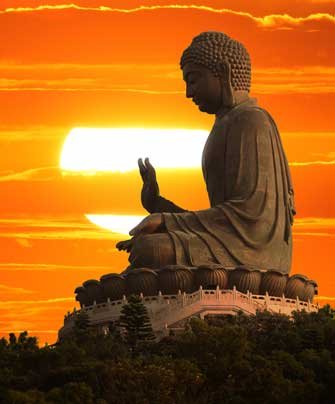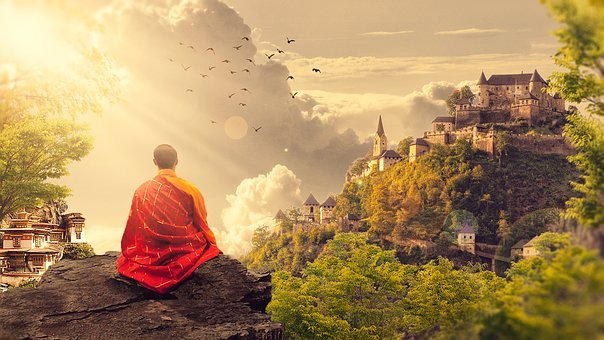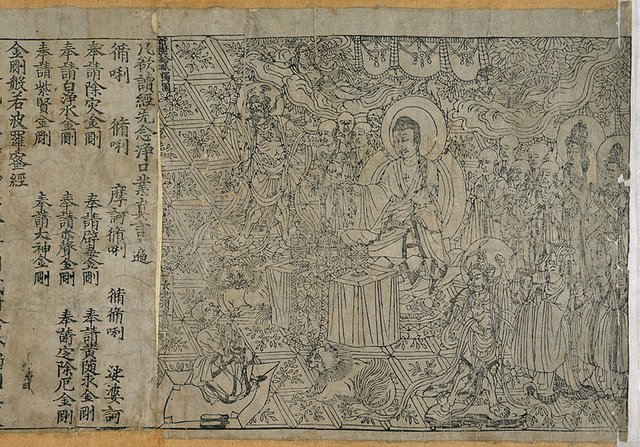Vipassanā Meditation Q&A + One Of The Most Profound Discussions on The Mind and Meditation
It is absolutely amazing when a certain speech, or chapter or an answer purely consist of quotable wisdom. You can learn, watch and remember many things. Bu a set of wise words is like a formula. It doesn't exactly give you answers or solutions outright. What it does is that it gives a formula that is going to enable you to solve a great deal of coming problems. Wise words show you where to look. Sometimes where you look can contain all the answers and it would be a small paragraph that led you to all of that insight.
The Greatest Source of Wisdom
All wisdom has to be realized by a mind and the mind itself is the greatest and also the most primal source of wisdom. Bu there is also a short cut. You can spend some time with a wise person and learn from what that mind has realized. That is why a moment with a person of wisdom is far more valuable than years of studying. Education, at most times is a hindrance to acquiring wisdom.
I was fortunate enough to come across one amazing Q&A that captured many of the things I personally hold true and it is always a sublime pleasure to come across those with great insights. It is the greatest family one can ever have. I'm going to start with the part that captured me the most.
.
.
.
.
.
.
.
.
Sorry, There are too many parts that captured me. So I'm going to end up quoting a lot.

Question: What is the greatest obstacle to someone progressing in Buddhist practice ?
The information, the programming, that we carry with us; which is described as the fixed views and opinions that we have about life, about Buddhism, and what Buddhism is.
All of the Ajarns who have practiced and taught correctly emphasize the practice only, however because many of us have different lifestyles periodic reading can be an aid. In many meditation centers reading is prohibited, as it is often the greatest obstacle to development. The head Ajarn of the Vipassana administration in Thailand has pointed out that as little as five percent of so-called Buddhists actually follow what The Buddha taught, thus he does not allow reading. He teaches to learn the truth first, by observing the mind, then one can learn what is not true afterwards by reading some of the so-called religious books.
If books illuminate the necessity of mindfulness and clear away unnecessary baggage then they are useful. If they cross the boundary of common sense, or stray from The Buddha’s basic teachings of cause and effect, then they should be regarded as nice stories. One should remember that The Buddha did not write any books, and really he was not religious at all. He pointed out the nature of human beings, he was a scientist of our mind and body process, so it is not necessary to be a religious believer. Whether we follow a religion or not, and whatever we choose to believe, our nature as human beings is exactly the same, and these teachings are things to be proved, not believed.
When The Buddha taught there were no Wats or temples, no images, candles, or incense, no ceremonies; people just practiced. His teachings were remembered by some and told to others as stories. Over four hundred years later these stories were collected and written down, so it is obvious that embellishments and errors were also written down, and that many stories were rejected or accepted on the social values of the times, or the influence of a particular member of The Sangha.
During a period of over two thousand years it is also probable that there were revisions and additions from various scholars who may or may not have been well-practiced. So that in today's translations there are quite a few instances of what The Buddha did not teach.These things should be considered, and books should be used as reference material rather than taken as the truth of what has happened in the past.
Many untruths have been spread on the strength of fame and scholarly certificates, leading many people of common sense to think twice about the Buddha’s message, and the merits of genuine Sangha members. In some instances the incorrect teachings of a few have led to the total rejection of all the Sangha by the narrow-minded, leading them to think that there can be Buddhism without the Sangha.
Ranks, titles, and scholastic degrees, are the trappings of society, and should be understood as such. However, due to the ignorant nature of society, it comes as no surprise to find that those with official-looking pieces of paper exert the most influence.The Buddha himself taught not to worship or believe in him, but to watch the mind and realise one’s own nature. And although many members of The Sangha are worthy of great respect because of their dedication to correct practice and selflessness in the uplifting of society, none of them surpass the value of the teachings.
Buddhism has suffered much less than other religions from gross fabrication, there is no reliance on literary works as a foundation or proof of Buddhism. Long before Buddhism, there were religions based upon virgin births, gods come to earth, bringing the dead back to life, in fact just about anything that is humanly impossible. Stories may be true or untrue, but for Buddhism their is no necessity to believe. There are no efforts to convert people, and in comparison to other religions it is not really a religion at all, but a science, of how our nature really is.From the uncertainty of various writings, and the variety of uncertain teachers, comes the necessity to follow the very basic teachings of The Buddha, of morality and samadhi (mindfulness), under the guidance of an Ajarn who is merely a servant of The Buddha, and realize for oneself the cause and effect nature of existence.
Question: Is it necessary to practice in strict silence when developing Vipassana meditation ?
No, this rule of silence is not really a Buddhist practice, but is generally favored by Westerners due to their ideas being influenced by the practices of other religions.Remaining silent does not aid Vipassana in any way, it is not being natural and relaxed. When one is practicing talking should be kept to a strict minimum of course. Daily interviews, when practitioners do talk, are a part of the practice that helps to balance the mind. Forceful silence tends to make people become unbalanced and fierce.
When staying in a Wat or meditation center, it is impossible to expect everyone to remain silent. Not everyone will be practicing because there are so many other things to be done in the daily affairs of the Wat. Also there are different periods throughout the year that involve the instruction of bikkhus and nuns in things other than meditation. When one stays in a Wat some will be practicing and some will not, to be upset by other people talking shows a lack of Vipassana, and scores ten points for attachment. It is a case of mediators not knowing what is samadhi, and what is Vipassana.
Vipassana can be practiced anywhere, noise is no problem at all if you don’t attach to it. Just go and stay in any forest in Asia, they are far noisier than many towns and cities, and after it has rained the noise of the insects and frogs becomes quite deafening.
Question: What is the ultimate knowledge: >>> To know and understand the sight of your own eyes, the sound of your own ears, the smell of your own nose, the taste of your own tongue, the sense of your own body, the mood of your own heart, the thoughts in the mind, and why all these things arise. This is the ultimate knowledge.

Question: What is the first stage in the development of Vipassana ?
Realizing that you have a mind, realizing that there is Nama and Rupa, or mind and material objects, instead of an ‘I’ or a ‘me’. This is something very basic, but something that 99.99 % of society are not aware of.Whenever there is contact between our environment and a sense organ, there are two elements involved, the materiality that comes into contact with the sense organ, and the mind that knows this contact, is aware of this contact.
There is no ‘person’ doing anything, there is just a cause and effect process.
Most people are not interested in mind development because they are not even aware that they have a mind, or they think that the mind is the brain so life is assumed to be completely material. A lot of people who are interested in meditation also do meditation without ever coming to realize that there is Nama and Rupa. As well as many people who know the sutras inside out, yet are not aware of their own mind process, simply because they have never spent the time to watch.
In Thailand, Pra Kru Palad Kao has put in a lot of time and effort teaching the experts, the scholars, who have had all the degrees, ranks, and titles, concerned with the study of the sutras. He had to be very careful with them because they were people of high esteem in their respective areas, and one of them was even the head of The Sangha in another Asian country. But not one of them knew the first thing about which they were supposed to be highly qualified, not one of them was even slightly aware of their own mind process. In their own minds they thought they knew it all, and some of them even thought they were already enlightened. They knew the knowledge in the books, but they had never realized it in their own practice, they had never actually experienced it.
It is not uncommon to meet mediators who state how long they have spent in India, etc., have done so many courses, have been with this teacher and that teacher, learned this method and that method. They give you a very attractive dossier on their ‘personal’ achievements and their attachment to the fashion of being a mysterious mediator, but still don’t realize the first thing about their own nature.
If you want to realize the basics, never mind the various methods of concentration, moving the mind to different parts of the body, or the hand movements (not The Buddha’s methods). As meditation has now become quite fashionable there are countless methods being taught, but meditation without awareness of the mind is a complete waste of time. Put the mind upon the rising and falling of the breath at the abdomen (or nose) and watch the thoughts, feelings, sounds, and sensations, as they arise upon the mind, and note them.
Don’t become trapped by being a scholar, an expert, or even a mysterious mediator, just watch the mind process, realise Nama and Rupa, and everything will begin to unfold.

Question: What is the second stage in development ?
Realizing that every arising in the mind is conditioned, i.e. that everything is a cause and effect process. Nothing arises without a cause, and the opposite applies that if we take away the cause, then the arising ceases. This is something that is easy to see in our environment, but realizing it in the mind process can only done by watching the mind. There is a condition for everything that happens to us, and a condition for everything that we do. Even our bodily movements are preceded by a condition, the intent in the mind. Unless people spend the time to slow down and watch the mind, they will never realize this fundamental awareness.
There is great depth to this particular realization, because it also unfolds the mysteries of the birth of all beings as well as the arising of all phenomena upon the mind. This awareness leads to a more complete awareness of phenomena arising upon the mind, where the initial, middle, and falling away, stages of each arising can be seen. At this point one begins to really understand the nature of all these sights, sounds, tastes, smells, thoughts, feelings, and sensations. That is, that they are not a part of an ‘I’ or ‘me’, but are simply reactions, results, that come and go according to various conditions.
They are seen and understood as not belonging to a ‘self’, seen as being in constant flux, forever changing, and thus understood as being unsatisfactory in nature.It will also be realized from this that all of your past experiences have had this same nature, and all of your future experiences will have this nature too.
Past, present, and future, all the same, what a misadventure you are starring in !
From here there is the obstacle of very clear and strong samadhi to overcome, and once this is let go of the first path of stream entry begins.

Question: What is the most important part of Vipassana meditation ?
Noting, the noting of all phenomena that arise upon the mind.Some people who have practiced meditation for a while often think that it is not so important, and that the most important part is to keep the mind upon the breath. This is incorrect, noting is the part of the meditative process where one lets go of phenomena that has arisen, returning the mind to the breath is secondary.When we meditate, and thoughts begin to arise, it is not enough to just be half aware that we are thinking, because then we will carry on thinking as before. When we are doing sitting meditation, our ability to note ‘thinking, thinking’, ‘feeling, feeling’, and ‘hearing, hearing’, is the actual letting go, returning the mind to the breath then moves the mind away from the thoughts, etc., and gives it a neutral object.
It is a mechanical process because our mind works in a mechanical way. Whatever arises does so because of conditions. By noting phenomena that arise upon the mind we are letting go of them and replacing them with the noting, then we let go of the noting and replace it with the breath.The phenomenon is no longer present because we have let it go, we haven’t wrestled with it or tried to push it away, it has gone because we let go of it, and if it returns we do the same again. If our practice is skillful and correct, eventually it will become a spent force and disappear completely.
During our daily activities the actual time spent sitting may be quite short, but as long as we are skillful at noting, then we will be able to avoid unwholesome phenomena in any situation.

Questions: Does the practice of letting go mean that we have to let go of all happy experiences also ?
The practice of letting go is to develop awareness and understanding of the nature of what arises in the mind.It does not mean that you do not experience happiness, but as you become more aware of the nature of what you experience, then your idea of happiness will change.Things that you attached to yesterday will be let go of today, just as you did in your change from child to adult.
Every being likes to experience happiness, but we all have different ideas about what makes us happy. When we lack understanding of the nature of things, then we often attach to happiness that bites. From letting go, as opposed to attaching and abandoning our minds to all experiences, we develop understanding. Once we have understanding then we are able to exercise direction in our lives.
The end result is a free mind, which is happiness all of the time. In society, a person's idea of happiness can be compared to the images of all the advertising companies; you have to pay for it, and it doesn’t last. There is no need to become a religious robot, with a mind full of excessive discipline, incantations, and guilt, all this too must be let go of. By letting go we find that our natural condition is one of happiness and contentment.

Those were the parts that I connected with the most and those are the parts that I admire the most. You can read even more very important answers and insights at http://www.palikanon.com/english/vip_questions/vipassana.htm The website is mostly focused on Deutsch Language. but there are some English Language content that you can dig out. So consider giving it some time. As part of my efforts to inscribe wisdom onto the Blockchain I've previously added Vajracchedikā Prajñāpāramitā Sūtra (Diamond Sutra) which is one of the most profound statements in existence which you can read by following the above link.
This post is just incredible, as someone who actually respects meditation and who tries to live free of greed and trying to better myself and accept the world (and try to be more wise in the process) I actually find myself attracted into this so much I actually went and read the Diamond Sutra.
In the end, being smart is about using your brains.
Being wise is about acceptance (not tolerance), acceptance and release...
I can only hope people see this and awaken... I'm nowhere near wise, but I know that only by trying can you ever glimpse enlightment... considering yourself wise or enlightened is just wrong...
You got a follow and 100% vote. It's great to see someone who actually understand these things. I'm not fully enlightened. But I know that I have improved and I know that I will improve. From the life that I've lived i fully well know that true improvements comes through understanding and the door to the understanding is acceptance.
Tolerance is just yielding to pain or simply bowing to the wonder. Tolerance is also running away or being passive/stealth aggressive. Acceptance is like receiving a a locked treasure/puzzle. After acceptance you can slowly solve that puzzle piece by piece and grow as a human being.
Just taking a moment to watch your breath can give massive results. You don't even have to sit down and pose. Just a quiet moment of awareness while traveling can be enough.
BTW, I made the last comment personally as a human being, but I also sent this post to be featured in our curation compilation
https://steemit.com/curation/@poeticsnake/you-got-snekked-curation-compilation-19
And as we tell to all the good authors we curate:
You got SNEKKED!
Because we love your post!!
You Got Snekked is a curation project!

We aim to find good content, share a happy moment, & some visibility. Your post got our upvote, and we will feature your post and possibly an image from it in our curation compilation if you don't mind! If you don't want to be featured, please let us know!
You can find us on Discord
https://discord.gg/VWJxTEz
It's not a huge vote though, but just so you know your efforts are appreciated
You are always free to curate any article I post on STEEM. spreading the knowledge and making good connections come first. I value resteems+follows more than upvotes. I'm always happy to see more people reading my content :-)
@smartbot tip 1
Your post has been tweeted to 2000 followers. Follow me on twitter
Your post has been shared with 2000 facebook members. Join facebook group
Σ$$$ Tipped @vimukthi
Σ1 SMART! Comment@smartbot helpto claim. Currently the price of SmartCash in the market is$0.071 USDperSMART. Current value of the tip is$0.07 USD. To find out more about SmartCash, please visit https://smartcash.cc.Your post has been resteemed. Thank you for using my resteem service
Join my discord server for free resteems